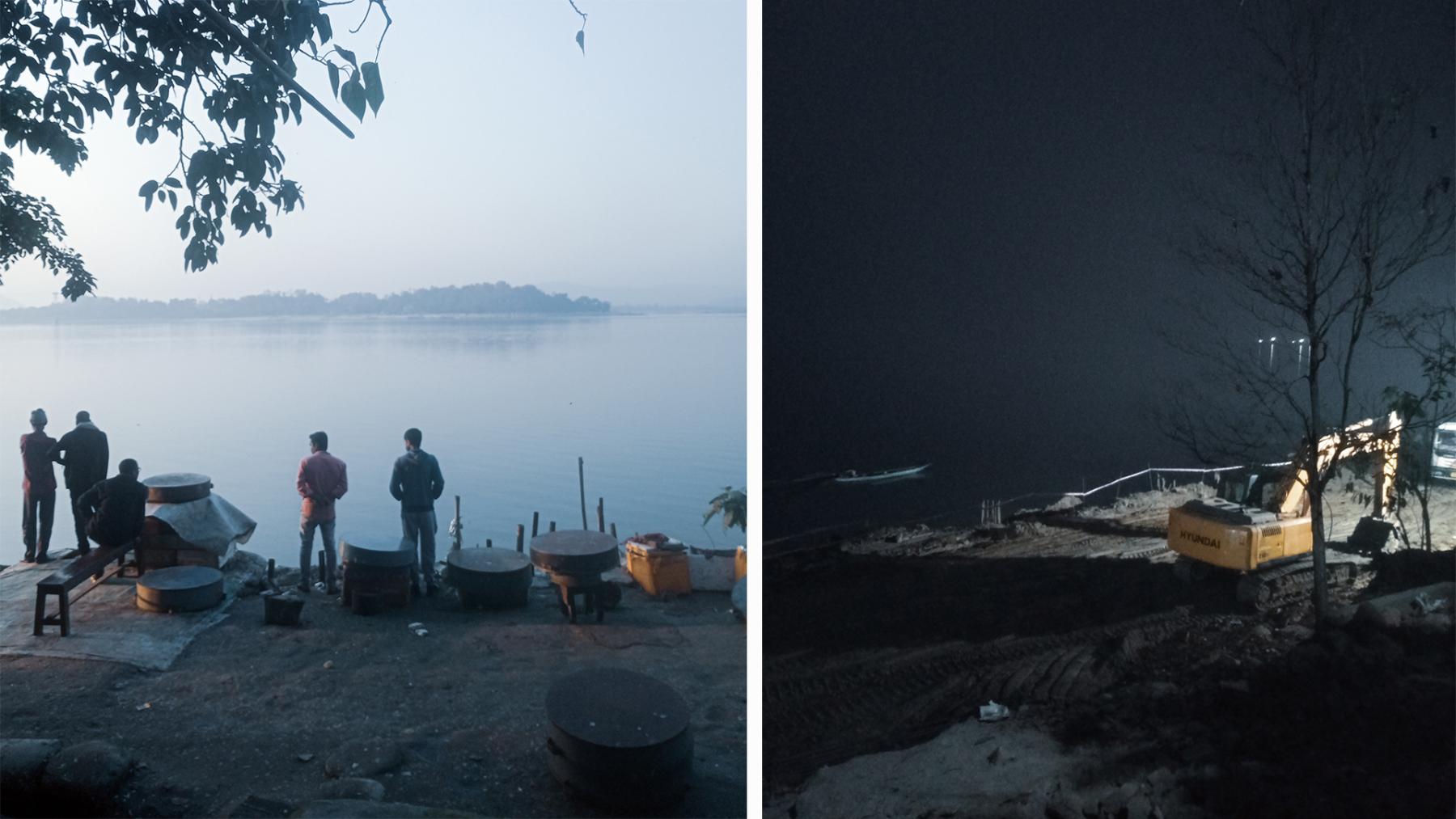The State of Goodbye

In this aloneness of life, in this absurdity of the evening
there is a long road
that unspools from the Planetarium to the Governor’s residence
The Luit slithers alongside, caresses the mossy soil and land,
of chunks which submerge sometimes—when summer arrives. Eternally,
carrying the view of the North bank, whose less disciplined roads promise hidden views, hidden enchantment.
There is no other road that foretells the future of Guwahati:
a future of resting places disappearing; a tree-laden sky once, now no sky remains; nowhere where your tired ass can cradle:
a future where lanes, lightless but brightest are dressed up in blinding business entrepreneurial river-toured lights
to erase a history, you and I made.
Once, cut off—into the lit and the unlit, this path is now as erect as any streak of light, bursting from outer space, and lights an entire people, civilises them: the river fish; the cracked chai-matkas; those joggers whose bellies never not bulge; hardworking professionals, hardworking slackers who traverse this city for bad tea; lovers who are not yet former lovers;
by the Luit:
people, on their first day in town
people, on their last day in town
and I, remembering last week’s dreams
where she says my lips taste bad, and then kisses me once more.
Hunting solitude but without gut feeling
there are ones who stride down the pavement
with occasional grace
thinking,
“I wished to be alone but now no longer”
They space through panoptic ganjedi presences, the green smell catches them unawares only making them ever more aware—like CCTV cameras; they enjoy seeing and being seen; the smoke enjoys being smelt.
Where, in Guwahati, like someone once remarked—a city where love is still public; park benchers, subversive, split wide open the hollowed morality
of erstwhile Gauhati and future Guwahati
by their hands
which slide around their lovers’ backs, stealing kisses around lips, napes, the airy unnamed hundred year old trees spread across above—where bodies begin to understand nature.
The apolitical become political: hope emerges for the next, the boundlessness of existence tremor in their eyes. Even the big banner carrying Himanta’s smile, untangles and leaves, blown away by the wind leaving behind steely framework, where air can finally move along untethered.
A barista, who is known for rolling and smiling—looks through his window and looks through me. Anyone can make out by his smile—sorry, sad or hopeful, if your heart has been broken today.
With a light inching ever closer, lovers lure away their loves from bustlement into quieter bustlement—where you can look at the nightly Brahmaputra, its waters freed from cruises, and finally feel another on the other side, doing nothing but looking back.
The river only reflects, and lips speak while sealed, clothes beg to be torn apart, leaves of trees are sewn together and they dance with the wind—like how we danced once. Love makes us, Cortazar said.
It astonishes how a walk as meandering happens on a road so straight: the smells are rich and poor; the tea both rich and poor; flowers in the temple rubbish; nullahs into the river; deodorant and alcohol.
All are wafting, scouting the unsuspecting passerby, deep in the throes of attraction, which for three kilometers worth is yet to find form.
The road then, at last, bends into an S and picks up altitude. But as you move along, you drown.
The hill road that it has become, snakes itself toward the Governor’s house and the Governor who was last in the news for something not too enviable, is invisible.
Instead, the hill relentlessly flirts with the river, and I recall once, when I flirted too in vain. No, not in vain.
The road here is swinging and scaling. It will remember there were once two blocks of concrete, boulderlike where two sat facing each other once, in hope.
The city has ended, the river too.
In the togetherness of death, memory maps a future of absenting.
Raghu Pratap is a writer-filmmaker and a student of Law at the Gujarat National Law University. His interests lie in memory \, death, trauma and transgression. Working both in visual and written media, he articulates these concerns through various formal experiments. He has twice curated NE Shorts: Screening of Short Films from the North East, as well as various other film programmes. He is a contributor to a forthcoming anthology on North East India to be published by Mariwala Health Initiative (MHI). He has also worked and collaborated with NEthing Northeast, Zubaan Books and TheChinkyHomoProject.
Raghu also writes extensively on politics, music, cinema and literature. His writings have appeared in The Assam Tribune, Raiot Collective, Catharsis magazine, Asian Movie Pulse, among others. His film, 'A Night of Soap Water' was longlisted for Toto Funds the Arts 2023.




